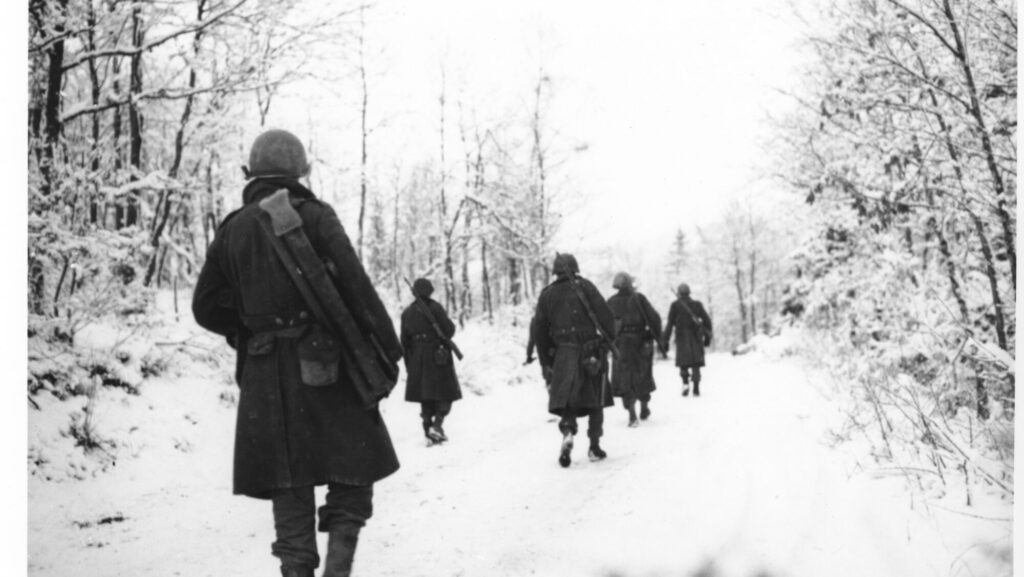
American soldiers of the 84th Division are shown moving up to new positions through the snow covered countryside in Belgium. Co I, 333rd Infantry Regiment.
Attempting to expound someone else’s thought is always a high-risk endeavor. But since I recently declared Dalmacio Negro Pavón the most significant political thinker in Spain in recent decades, with all due caution, I will outline what I consider to be some of the interpretive keys to Negro Pavón’s thought.
The story of the Christmas truce of 1914 is well known to us: Allies and Germans laid down their arms and exchanged greetings and gifts, played football matches, and even took photos together. But there is another, lesser-known Christmas truce that took place thirty years later, on Christmas Eve 1944, during the Battle of the Bulge, the last German offensive in the West. In a hunter’s hut in the Hürtgenwald, on the German side of the Belgian border, four German and three American soldiers laid down their weapons and shared Christmas dinner.
The Vincken family hut was home to Elisabeth Vincken and her 12-year-old son, Fritz. Her husband, Hubert, was a baker by trade, but now belonged to the Reichsluftschutzdienst (air protection service) in the German town of Monschau, a few kilometres away. The family was from Aachen but, because of the Allied bombing raids, mother and son had moved into the hut.
Hubert was unable to attend that evening, so Elisabeth decided to postpone Christmas dinner until New Year’s Eve. However, there was a knock at her door, and in front of her hut stood three American soldiers, one of them seriously wounded. Fritz Vincken recalled,
When my mother opened the door, there were two men outside. They spoke a strange language and pointed to a third man sitting in the snow with a bullet wound in his upper leg. We knew they were American soldiers. They were tired and cold. I got scared and wondered what the hell my mother would do. She hesitated for a moment. Then she waved the soldiers into the hut and told me to bring six more potatoes from the shed.
The soldiers had been lost for three days and did not speak German, although they were able to communicate with Elisabeth by sign language and a little French. The hostess then decided to serve the postponed Christmas dinner to these new guests. She put Hermann (the fattened cockerel, named after Hermann Göring) in the oven, and Fritz began to set the table for five.
The door soon shook again, and this time it was not more Americans, but Germans— a corporal and three soldiers who had also lost their regiment. Summoning up her courage—for taking in enemy soldiers meant death—Elisabeth told them that they could come in and share a meal, but that there were other “guests, whom you will not consider friends.” The corporal asked if they were Americans and Elisabeth replied that they were, and that one was wounded, insisting, “It is Holy Night and there will be no shooting.” The soldiers agreed and Elisabeth asked for their weapons, then went back into the hut and did the same with the Americans.
Inside the hut, the soldiers eyed each other warily, as Fritz recalled later:
The tension between them gradually faded. One of the Germans offered a loaf of rye bread and one of the Americans brought out instant coffee to share. The men were eager to eat, and Mama motioned them to the table. We all sat down as she blessed the table. There were tears in their eyes and I saw that the battle-weary soldiers were excited. Their thoughts seemed to be many, many kilometres away.
The next morning, the German corporal handed a map and his compass to the American soldiers and directed them back to their lines. Elisabeth said goodbye to all of them: “I hope that one day you will return home safe and sound to where you belong. May God bless you and take care of you.” The Germans and Americans shook hands and departed in opposite directions.
Reader’s Digest magazine published Fritz Vincken’s story, “Truce in the Forest,” in January 1973, but it was further popularised by President Ronald Reagan on 6 May 1985, in his speech at the Bitburg war cemetery in Germany: “That night, when the storm of war was shaking the world, they had their own armistice. Those boys were briefly reconciled in the midst of war. Surely we peacetime Allies must honour the reconciliation of the past 40 years.” The Christmas truce would later make its way to television, on the programme Unsolved Mysteries, broadcast on 24 March 1995. 2002 saw the release of Silent Night, starring Linda Hamilton, which—with the usual artistic licence of film—recounts the events of that night.
Hubert and Elisabeth Vincken died in the 1960s. Fritz married and opened a pizzeria in Honolulu. After the story was aired, someone contacted the channel to tell them that an elderly man living in a nursing home in Maryland had been telling the same story for years. Fritz flew to Maryland in January 1996, where he met with one of those soldiers, Ralph Henry Blank, who still had the compass and map that the German corporal had given them. Ralph told Fritz: “Your mother saved my life.” Fritz Vincken died in 2001, but whenever he was asked about that Christmas truce, he always remembered his mother saying: “God was at our table that night.”